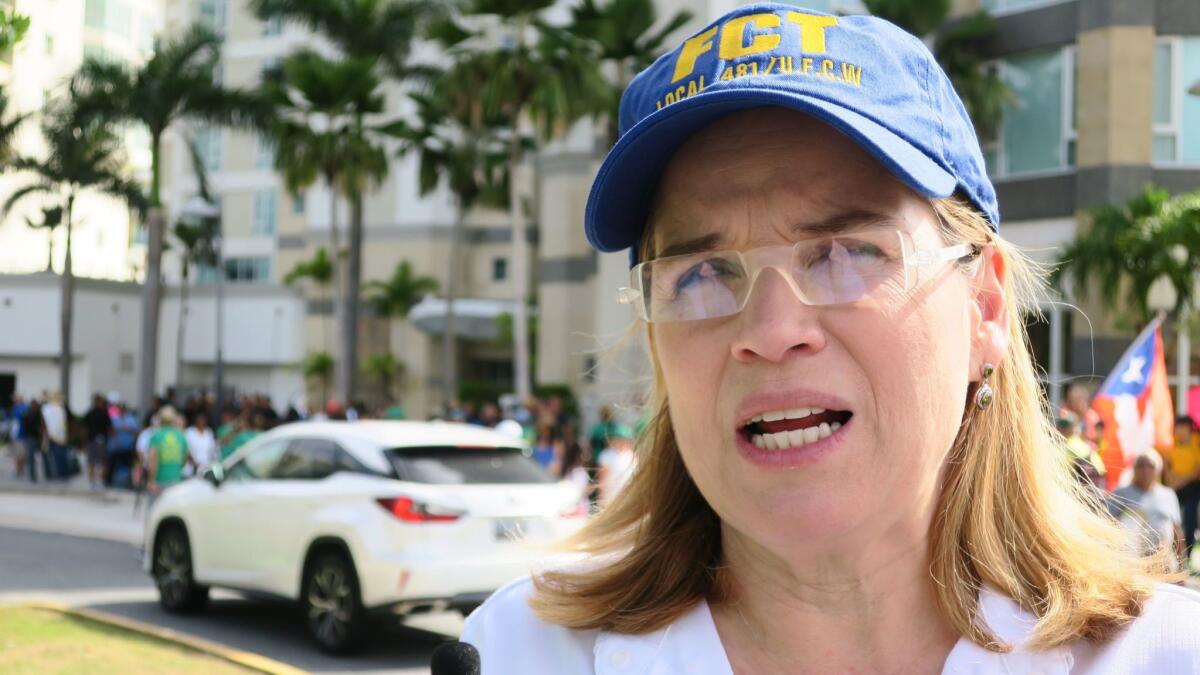Thousands of Puerto Ricans protest austerity measures and slow hurricane recovery

- Share via
Reporting from San Juan, Puerto Rico — Thousands of Puerto Ricans marched Tuesday to protest pension cuts, school closures and slow hurricane recovery efforts as anger grows across the U.S. territory over looming austerity measures.
The May Day protest attracted teachers, retirees and unionized workers from both the private and public sectors, as well as the mayor of the capital of San Juan, Carmen Yulin Cruz. Among those who marched through the city’s financial center before the protest grew violent was 56-year-old Juan de Dios del Valle, a government worker who was laid off in 2008 and has since found only occasional jobs as a gardener or janitor.
“I’m here to support all those who are mired in poverty,” he said.
The protest was peaceful until hundreds of young protesters, many with their faces covered, threw rocks and other objects as they clashed with police who fired tear gas and rubber bullets to disperse the crowd. Several protesters and police officers received head wounds and other injuries as clouds of white smoke billowed through the Hato Rey district, where many banks and financial institutions are located. Police said several people were arrested as protesters set fire to palm tree fronds and debris including an old refrigerator.
Concerns that the protest could grow violent led the island’s biggest mall to close for the day, along with several banks, government agencies and schools. Gov. Ricardo Rossello of the New Progressive Party condemned the violence, saying it tarnished Puerto Rico’s reputation.
“Freedom of expression cannot turn against ... the safety of human beings,” he said.
Adria Bermudez, who works at Puerto Rico’s largest public university, said she was marching against the increase of the undergraduate cost per credit from $57 to $115, then to an eventual $157 over five years. She also demanded that government officials and legislators reduce their salaries instead of implementing more austerity measures.
“The measures are aimed at the middle class and low middle class,” she said. “The rich don’t suffer.”
The march comes as Puerto Rico tries to emerge from an 11-year recession and restructure a portion of its $72-billion public debt load while recovering from last year’s Hurricane Maria. The storm caused an estimated $100-billion-plus in damage, and some 30,000 power customers remain in the dark almost eight months later.
Economists warn that the poverty rate on the island of 3.3 million people could increase from 45% to more than 60%. Meanwhile, a federal control board overseeing the island’s finances approved several austerity measures in late April that Rossello has refused to implement. These include a 10% cut to a public pension system facing nearly $50 billion in liabilities.
San Juan’s mayor called on Congress to eliminate the control board, which it created two years ago to help resolve Puerto Rico’s economic crisis.
“It’s bad, period, if it takes away the rights of the working class,” she said.
The recently approved pension cuts are one of the main reasons that Ramon Caban, a 60-year-old retired worker from Puerto Rico’s power company, decided to join the march.
“It will be unbearable,” he said. “The future of Puerto Rico is extremely unstable. It’s exasperating because nobody can make plans for the future.”
UPDATES:
7:50 p.m.: This article was updated with details of the protest and background on the Puerto Rican economy.
This article was originally published at 9:40 a.m.
More to Read
Sign up for Essential California
The most important California stories and recommendations in your inbox every morning.
You may occasionally receive promotional content from the Los Angeles Times.













